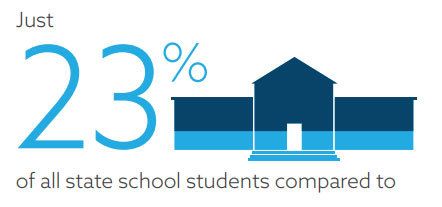A national social mobility charity committed to empowering young people to realise their potential.
Who we are
We are passionate about equipping young people with the skills and resources to flourish.
We deliver impactful programmes in collaboration with schools, colleges, universities and employers in areas of socio-economic deprivation or under-representation across the England.
By empowering young people from under-represented backgrounds today, we are shaping a future that is fairer, more inclusive, equitable and full of opportunity.
What is under-representation?
We focus on young people who face barriers to higher education and careers.
Many of our students come from communities with historically low access to higher education, including:
- Students eligible for free school meals or pupil premium.
- Students with special educational needs and disabilities.
- Young carers and care-experienced individuals.
- Refugees and asylum seekers.
- Black, Asian, and minority ethnic young people.
- Students from Gypsy, Roma and Traveller communities.
Most of the young people we support do not have family members or close peers with experience of higher education or careers. Our role is to help them imagine new possibilities and take confident steps toward their goals.


What we do
Villiers Park delivers a range of impactful, tailored programmes that empower young people to realise their potential. Our programmes support young people to develop a greater range of possible selves through new opportunities, experiences and self-reflection.
At the heart of our work is a team of dedicated Progression Coaches who work directly with young people in their schools or colleges. These dedicated professionals provide one-to-one and group coaching, helping students build confidence, develop essential skills, and overcome barriers to success. This hands-on, embedded approach builds trust and creates meaningful, lasting change.
We also provide opportunities for students to step outside their comfort zones and expand their horizons through
Leadership Challenges and interactions with universities and employers. These initiatives help young people develop critical skills such as communication, problem-solving and resilience while introducing them to higher education and career pathways. From workshops and courses to employer and university insights days we empower young people to pursue their ambitions and take confident steps towards their future.
Our Impact
We work with hundreds of young people every year, empowering them to succeed in their chosen field.
News
Keep up to date with the latest news, views, stories and insights from Villiers Park Educational Trust.



